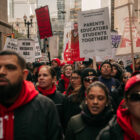This article was jointly produced by Workday Magazine and The Nation. When Israel escalated its military operations against Gaza in October, Rahaf Othman was so distraught, she said, she “couldn’t think straight.” The 45-year-old Palestinian American, who teaches social studies at Harold L. Richards High School in Oak Lawn, Ill., recalled that she “started getting nightmares from my own experiences when I was in Palestine. I was functional at work, but barely functional. My brain was mush. I was getting traumatized every time I turned on my phone.”
“For the first month, people were asking me what we should do, but I couldn’t think, couldn’t focus.” While in this state, she said she discovered that she could lean on some of her colleagues.











